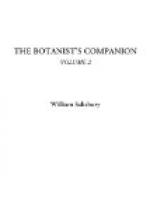Similar Plants.—Verbascum Lychnites; V. nigrum.
The roots of the Henbane are to be distinguished by their very powerful and narcotic scent.
218. Hyssopus officinalis. Hyssop. The Herb. L. E. D.—The leaves of Hyssop have an aromatic smell, and a warm pungent taste. Besides the general virtues of aromatics, they are particularly recommeded in humoral asthmas, coughs, and other disorders of the breast and lungs; and said to notably promote expectoration.
219. Inula Helenium. Elecampane. Root. D.—Elecampane root possesses the general virtues of alexipharmics: it is principally recommended for promoting expectoration in humoural asthmas and coughs; in which intention, it used to be employed in the Edinburgh Pharmacopoeia: liberally taken, it is said to excite urine, and loosen the belly. In some parts of Germany, large quantities of this root are candied, and used as a stomachic, for strengthening the tone of the viscera in general, and for attenuating tenacious juices. Spiritous liquors extract its virtues in greater perfection than watery ones: the former scarce elevate any thing in distillation: with the latter, an essential oil arises, which concretes into white flakes; this possesses at first the flavour of the elecampane, but is very apt to lose it in keeping.
220. Juniperus Sabina. Savine. The Tops. L. E. D.—Savine is a warm irritating aperient medicine, capable of promoting all the glandular secretions. The distilled oil is one of the most powerful emmenagogues; and is found of good service in obstructions of the uterus, or other viscra, proceeding from a laxity and weakness of the vessels, or a cold sluggish indisposition of the juices.
Similar Plants.—Juniperus oxycedrus; J. Phoenicea. These should be particularly distinguished, as Savine is attended with danger when taken immoderately.
221. Juniperus communis. Juniper. Berries. L. E. D.—Juniper berries have a strong, not disagreeable smell; and a warm, pungent sweet taste, which, if they are long chewed, or previously well bruised, is followed by a bitterish one. The pungency seems to reside in the bark; the sweet in the juice; the aromatic flavour in oily vesicles, spread through the substance of the pulp, and distinguishable even by the eye; and the bitter in the seeds: the fresh berries yield, on expression, a rich, sweet, honey-like, aromatic juice; if previously pounded so as to break the seeds, the juice proves tart and bitter.
222. Lactuca virosa. Wild lettuce. Leaves. E.—Dr. Collin at Vienna first brought the Lactuca virosa into medical repute; and its character has lately induced the College of Physicians at Edinburgh to insert it in the Catalogue of the Materia Medica. More than twenty-four cases of dropsy are said by Collin to have been successfully treated, by employing an extract prepared from the




